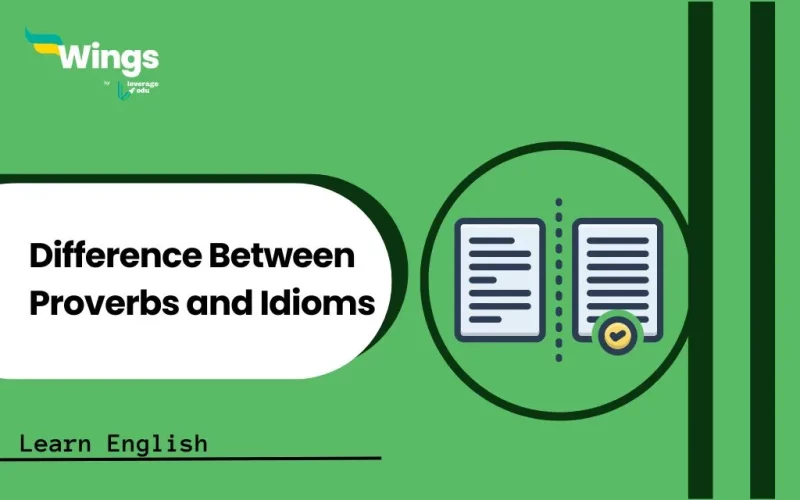What is the difference between proverbs and idioms is a common question that we all have had at least once in our lives. Well, they can be confusing for those who don’t know the meaning and have difficulty differentiating between the two. Talking about the two, proverbs are short sayings which give advice related to daily life. Meanwhile, idioms are phrases whose literal meaning is tough to interpret. To help out more with the difference, continue reading this blog which also has examples of both proverbs and idioms for you.
This Blog Includes:
Check out:
What is the Difference Between Proverbs and Idioms?
Differentiating between what are proverbs and idioms can be difficult as both seem the same but have different significances or the message behind them. So, to help you out, here is a table that lists the difference between proverbs and idioms.
| Proverbs | Idioms |
| A proverb is defined as a short saying or a piece of wisdom that has been passed down from generations and inspires others in their daily life. | An idiom, on the other hand, is a phrase that has its own meaning but cannot be understood easily. |
| It has a literal meaning that is used to help people cope with various stages of their life. | This has a non-literal meaning that is used in speaking, reading and writing. |
| Proverbs are used in day-to-day life. | Idioms are specifically used in poetry. |
| Finally, they are used to give suggestions to people. | While they are used to express an idea or a thought. |
Also Read: 501+ Best Idioms with Examples and Meanings
Examples of Idioms and Proverbs with Meaning
By now you must be aware of the difference between idioms and proverbs so we have now compiled some examples of both which will help you differentiate.
Commonly Used Proverbs with Meaning
| Proverbs | Meaning |
| A cat has nine lives | This proverbial expression suggests that cats are particularly resilient and can survive situations that would be fatal or harmful to other animals. |
| Actions speak louder than words | It means that what people do has a stronger impact and provides more insight into their true intentions and feelings than what they say. In simple words, actions prove |
| All that glitters is not gold | This proverb suggests that not everything that looks valuable or attractive on the outside necessarily has value. It warns one to be cautious of people’s appearance as they can be deceiving. |
| All is fair in love and war | It implies that in matter of love and war, people are not bound by the usual rules of fair play. In these two situations, people are permitted to use any means necessary to achieve their goals, regardless of whether those means are considered fair or ethical in other contexts. |
| Always put your best foot forward | It suggests to make a good impression by showing efforts in a particular situation. It suggests giving your utmost effort, displaying your strengths to achieve the best possible outcome. |
Commonly Used Idioms with Meaning
| Idioms | Meaning |
| It takes one to know one | This idiom suggests that someone making a criticism or accusation is guilty of the same thing they are criticizing or accusing others of. |
| Kill two birds with one stone | It’s often used to describe a situation where one action or decision yields multiple benefits or achieves multiple objectives simultaneously. |
| It’s a piece of cake | This idiomatic expression says that something is very easy to do or accomplish. Just like how eating a piece of cake is usually effortless, this phrase implies that the task at hand requires little effort or difficulty. |
| It’s raining cats and dogs | This idiom means it’s raining very heavily. It’s often used to describe a downpour of rain that is intense and persistent. |
| A Blessing in Disguise | It refers to a situation that initially seems unfortunate or unpleasant but ultimately results in something positive or advantageous. |
Also Read: 100+ Common Proverbs with Meaning and Examples
Similarities Between Proverbs and Idioms
After looking at the examples mentioned above, one can easily make out that both proverbs and idioms are figurative language that convey deeper meanings beyond their literal interpretations. To give you a better understanding, have a look at the similarities between the two.
| Particulars | Similarities |
| Figurative Language | Both proverbs and idioms use figurative language to convey meanings. They often rely on metaphor, simile, or symbolism to express ideas in a concise and memorable way. |
| Cultural Significance | Proverbs and idioms are deeply rooted in the culture and language where they originate from. They reflect the values, beliefs, and wisdom of a particular community or society. |
| Everyday Usage | They are commonly used in everyday language to express ideas, convey advice or prove a point. They are also used in both formal and informal contexts. |
Related Reads
FAQs
To differentiate between the two, idioms are used to express an idea or thought while proverbs are used to give suggestions or guide people.
The oldest proverb in the world is about a dog being hasty and therefore giving birth to blind puppies.
King Solomon wrote the Book of Proverbs.
This was all about what is the difference between proverbs and idioms. Hope you understand the concept and know how to proceed. You can also follow the Learn English page of Leverage Edu for more exciting and informative blogs related to grammar.
 One app for all your study abroad needs
One app for all your study abroad needs














 45,000+ students realised their study abroad dream with us. Take the first step today.
45,000+ students realised their study abroad dream with us. Take the first step today.

